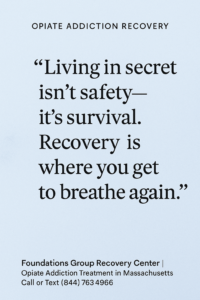Introduction
If you’re hiding your opiate use from your partner, family, or friends, you’re not alone. And you’re not broken. It’s exhausting—keeping the story straight, covering your tracks, pretending you’re fine when everything inside says otherwise.
As addiction counselors at Foundations Group Recovery Center in Massachusetts, we talk to people every day who seem like they’re holding it together from the outside. But inside? They’re scared, ashamed, and unsure how to stop without blowing up their life. That’s where real treatment—not punishment, not judgment—can make all the difference.
Let’s talk about what it means to live in secret—and how opiate addiction treatment can offer you a way out that’s safer, kinder, and built around your truth.
The Hidden Cost of Keeping It Together
When you’re using in secret, it’s not just the physical effects of opiates that wear you down. It’s the lies. The tension of waiting to be caught. The emotional distance from the people who love you—and the version of you they think they know.
Even if you’re managing work, parenting, or relationships, the cost adds up:
-
Missed moments because you were too foggy to engage
-
Snapping at people who ask too many questions
-
Constant fear that someone will find your stash or notice the signs
This double life doesn’t mean you’re weak. It means you’re surviving the only way you know how. But you don’t have to keep surviving like this.
Why It Doesn’t Always Look Like “Addiction”
People often think addiction has a look: unemployed, disheveled, “rock bottom.” That stereotype keeps a lot of people from getting help.
The truth? Many people hiding their opiate use hold down careers, raise families, and keep up appearances. They don’t fit the mold. So even when they start to worry something’s wrong, it’s easy to convince themselves it’s not “bad enough” to need treatment.
If that’s where you are—you’re managing, but it’s getting harder—you’re not alone. And you don’t have to wait until everything falls apart to ask for help.
Treatment That Respects Your Privacy and Pace
Opiate addiction treatment at Foundations Group Recovery Center is designed with discretion, dignity, and flexibility in mind. We understand that stepping into treatment is a big deal—especially when you’re still hiding your use.
Here’s what we offer:
-
Outpatient programs that fit around your life
-
Judgment-free clinicians who’ve worked with all kinds of people and stories
-
Evidence-based therapies that address both substance use and the stress that comes with secrecy
-
A trauma-informed approach that centers safety, consent, and your pace
You don’t have to tell your whole story on Day One. And you don’t have to do it alone.
Coming Clean Is Safer—and Easier—With Support
Trying to quit opiates on your own can be dangerous and emotionally overwhelming. Withdrawal symptoms, cravings, and the fear of being exposed can quickly lead to relapse or worse.
In treatment, you get medically supported care that makes detox safer and more manageable. You also get therapy—space to talk about the pressure of hiding, the guilt you might feel, and how to rebuild trust slowly and honestly.
Coming clean doesn’t have to mean confessing everything at once. Sometimes, it just means saying, “I want things to change.”
You Don’t Have to Lose Everything to Get Better
Many people stay stuck because they believe seeking help means they’ll lose their relationship, their job, or their independence. But real recovery isn’t about loss—it’s about getting back what matters:
-
Your clarity
-
Your calm
-
Your ability to show up without fear
Treatment helps you lay the groundwork to be honest, not perfect. And when you’re ready, we can support you in how to talk to loved ones, what to say, and when. There’s no one-size-fits-all plan—only a path forward that feels possible for you.
Ready to Talk Without Pressure?
📞 You don’t have to blow up your life to come clean. At Foundations Group Recovery Center, we offer opiate addiction treatment in Massachusetts that helps you move from secrecy to safety—step by step, at your pace. Call us today at (844) 763-4966 to talk it through.


